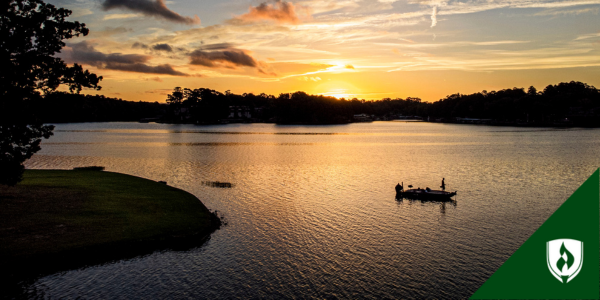The Police Officer Requirements You'll Need to Meet in Order to Serve
By Brianna Flavin on 07/19/2018

Despite loads of media attention and literal decades of TV shows and movies, society at large doesn’t have a very detailed picture of what it takes to be a police officer. These men and women are entrusted with the safety of our communities. For that reason, more goes into the job of selecting officers than many people think.
As you can imagine, becoming a police officer is a bit more complicated than strolling up to your local PD and asking for a job application. But police officer requirements can be a little confusing. Do they need to go to college? What are the physical requirements? Do the standards change from department to department?
If you are interested in seeing what a police officer hopeful needs to do before donning the badge, then read on. We’ve broken down the “must-have” police officer requirements that are non-negotiable, along with skills and attributes that may go above and beyond the minimum requirements but can be a real asset on the job. This will give you a better picture of what it takes to be a police officer.
“Must-have” police officer requirements
The following police officer requirements are pretty standard for most police officer positions in the United States.
Personal requirements
Candidates for police officer positions have to satisfy a few baseline requirements of their standing as a citizen. These personal requirements may vary slightly by department, but they are typically in line with the following:
- You must be a certain age (typically anywhere from 16 to 22 years old, depending on the state) at the time of police academy graduation.
- No recent (typically within the past three to five years) misdemeanor convictions.
- Must possess a valid driver’s license with a clean driving record—no DWI convictions.
- Must be a citizen of the United States.
- No felony convictions.
- Must have at least a high school diploma or equivalent.
- No domestic violence convictions or convictions for sexually related offenses.
As you can see, many of these qualifications revolve around an applicant’s character. Generally speaking, if you are of age, have a high school-level education, can legally drive and have stayed out of trouble with the law, then you’ll most likely be eligible.
Physical requirements
There are also physical police officer requirements. Officers need to be able to perform physical duties and to be able to respond actively in emergencies and crisis scenarios. It should come as no surprise that most police organizations prefer physically fit applicants.
Stamina and endurance is important for pursuit scenarios as well as remaining alert and ready during long shifts. Physical strength may also be a requirement for particular positions if officers will be expected to fight in hand-to-hand combat or move injured people to safety.
Vision and coordination are also important physical factors of the job as officers need to be able to use a firearm with accuracy, navigate obstacles and scan for fleeing suspects.
The specific fitness standards for an officer can vary depending on the department, but generally the assessment activities reflect scenarios an officer may face. For example, the Minneapolis Police Department’s physical standards include testing candidates’ vertical jumping ability, running speed and endurance as well as the number of push-ups and sit-ups completed in a set amount of time.
Education requirements
When it comes to education, the must-have police officer requirements get a little more complex. A high school diploma or equivalent is the absolute baseline, but the Bureau of Labor Statistics (BLS) reports that many federal agencies and some police departments require some college coursework or a college degree.* Typically, a college degree isn’t essential for entry-level law enforcement positions, but can be an asset for officers who are working their way up the ranks.
These education requirements vary from place to place and can even differ between police departments. Many colleges offer programs to satisfy the education requirements for police officers in their area.
If a candidate meets the above essential requirements, then they can be admitted to a police training academy. Training includes classroom instruction in state and local laws and constitutional law, civil rights and police ethics as well as more hands-on instruction in areas like patrol, firearm use, self-defense and first aid, according to the BLS.*
Police officer requirements that go above-and-beyond
The basics are important to have squared away, but there are additional skills and abilities that can help you stand out. Not only will these abilities and skills look good on a job application, but they will also help keep you safe and effective on the job.
Strategic critical thinking
Critical-thinking skills are valuable in nearly any career—but take on additional importance in law enforcement careers. The ability to quickly analyze a situation, weigh potential outcomes and formulate a response strategy can be a life-or-death skill on the job. This cognitive skill is a big reason police departments may emphasize college education, particularly for management-level law enforcement personnel.
Demonstrated communication skills
Police officers do a lot of talking and interacting with people. Critical job functions like taking command of a tense situation and gathering information about a crime depend on an officer’s skill in communicating and encouraging clear communication from others.
Empathy
Police officers interact with people from every walk of life, and while you may not personally agree with the actions or attitudes of all the people you’ll interact with, it never hurts to be able to put yourself in their shoes. This skill is closely tied to strong communication skills. If you can empathize with someone’s perspective and speak to them at their level, then you’ll likely have more success de-escalating dangerous situations and building trust in the community.
Leadership skills
Police officers are leaders in their communities. They stand out naturally in their badges, and communities look to them for help in emergencies. As an officer, you’ll need to be comfortable with that high visibility and be ready to lead when needed—particularly in difficult situations.
Physical fitness
All officers will need to be physically fit enough to pass the l tests required for police entrance exams, but it never hurts for officers to push themselves past that standard. It obviously takes strength and endurance to apprehend fleeing or physically combative suspects, so you’ll want to keep your standards high. Police training academies often teach hand-to-hand tactics and self-defense maneuvers to prepare officers, but ultimately, you’ll need the strength and physical ability to execute this training.
Knowledge of a second language
Knowing another language is an asset for any job, but it’s a huge bonus in policing—especially if your jurisdiction includes large populations of people who speak that language. In some areas, departments might prioritize applicants who know another language.
The number-one police officer requirement
As you can see, there are quite a few requirements police officers have to meet. But arguably, the most important requirement is a genuine desire to serve communities and keep people safe. If that sounds like you, and if you think the other requirements for becoming a police officer sound doable, then you might have it in you to join the ranks.
Being a police officer is definitely not for everyone, but for those who have the right skills and experience, it can be a truly meaningful career. But what else might draw you to a career in law enforcement? Check out our article, “Why Become a Police Officer? 5 Reasons You Can't Ignore,” for more on what makes this career amazing.
Related Articles:
*Bureau of Labor Statistics, U.S. Department of Labor, Occupational Outlook Handbook, [career information accessed June 11, 2018] www.bls.gov/ooh/.




